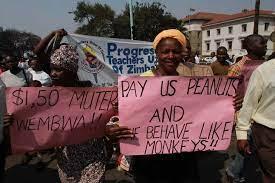News / Regional
No pay hike for Zimbabwe teachers
06 Sep 2025 at 19:16hrs |
337 Views

Zimbabwean teachers are bracing for yet another term of financial hardship, after government this week indicated there will be no salary increases in the immediate future. The third term begins on Tuesday, September 9, with educators still earning about US$270 plus local currency allowances, a figure that falls far short of the poverty datum line.
During a heated parliamentary session, Glen View North legislator Happymore Chidziva demanded to know what plans government had to review teachers' salaries in line with the cost of living, and whether additional non-monetary benefits such as housing and fuel support were being considered.
Labour and Public Service Minister Edgar Moyo, however, avoided making any commitment to new pay adjustments. He said salaries and conditions of service for teachers and other civil servants were continuously reviewed through the National Joint Negotiating Council (NJNC), but stressed that such reviews had to remain "fiscally sustainable."
Moyo highlighted that instead of across-the-board salary hikes, government was focusing on a package of non-monetary incentives. These include allocations of land for housing development, a duty-free vehicle importation facility, access to the Government Employees Mutual Savings (GEMS) scheme, and plans to expand institutional accommodation for teachers. He added that government continued to encourage school-based incentives supported by local communities and responsible authorities as part of efforts to cushion teachers from economic pressures.
The remarks have done little to ease frustration within the education sector, where wages remain among the lowest in the region despite the vital role teachers play. A 2021 report comparing regional pay scales showed that Namibian teachers earned the equivalent of about US$1,759 per month, while their counterparts in Botswana took home between P5,970 and P22,700. In Lesotho, the average teacher's salary in 2024 was around US$792 per month.
Against this backdrop, Zimbabwean teachers continue to struggle with wages that are less than half of what their peers earn elsewhere in southern Africa, a situation that has fuelled anger among unions and left many educators demoralised as they prepare to open schools for the final term of the year.
During a heated parliamentary session, Glen View North legislator Happymore Chidziva demanded to know what plans government had to review teachers' salaries in line with the cost of living, and whether additional non-monetary benefits such as housing and fuel support were being considered.
Labour and Public Service Minister Edgar Moyo, however, avoided making any commitment to new pay adjustments. He said salaries and conditions of service for teachers and other civil servants were continuously reviewed through the National Joint Negotiating Council (NJNC), but stressed that such reviews had to remain "fiscally sustainable."
The remarks have done little to ease frustration within the education sector, where wages remain among the lowest in the region despite the vital role teachers play. A 2021 report comparing regional pay scales showed that Namibian teachers earned the equivalent of about US$1,759 per month, while their counterparts in Botswana took home between P5,970 and P22,700. In Lesotho, the average teacher's salary in 2024 was around US$792 per month.
Against this backdrop, Zimbabwean teachers continue to struggle with wages that are less than half of what their peers earn elsewhere in southern Africa, a situation that has fuelled anger among unions and left many educators demoralised as they prepare to open schools for the final term of the year.
Source - NewZimbabwe
Join the discussion
Loading comments…



























